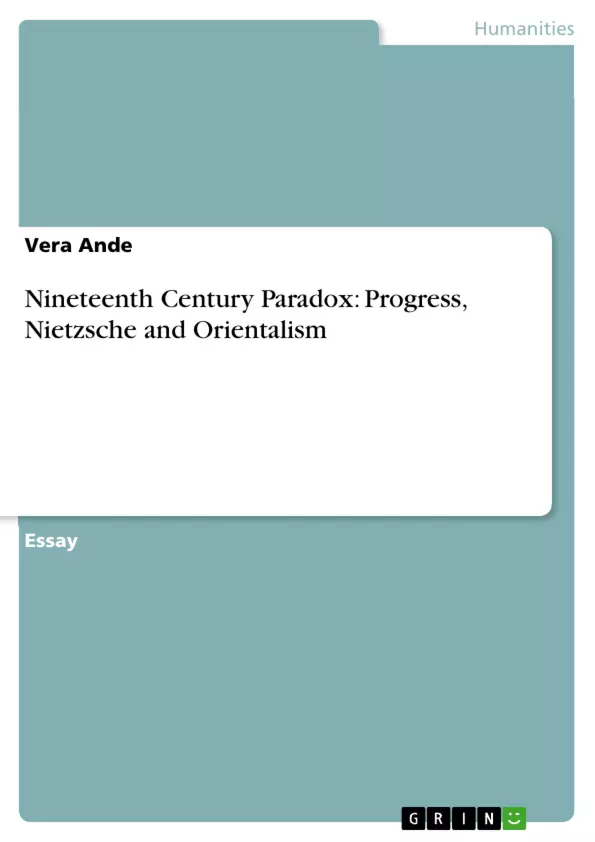The nineteenth century is usually referred to as the century of unprecedented progress of the Modern Age. It is, however, of high importance to realize the relativity of the concept “modern”. People living in a particular historical period of time always consider their time as modern. One may view “modern” as a distinguishably new way of life, change in technology, industry, culture and society, whereas another may relate the word “modern” to something that belongs to the present time. Again, the concept of the present is highly subjective to the observers of the so-called present and relative in the historical framework. The most applicable understanding of the word “modern” in this work is in its comparison with the times before the period of the nineteenth century. This essay presents an overview of how progress, orientalism and Nitzsche's philosophy co-existed and made sense of each other in modernity.
Inhaltsverzeichnis (Table of Contents)
- Nineteenth Century Paradox: Progress, Nietzsche and Orientalism
- The Century of Unprecedented Progress
- The Nineteenth Century as a Bridge Between Past and Present
- Political Changes and the Emergence of Democracy
- Industrialization and Urbanization
- Cultural and Scientific Transformations
- Orientalism: A Response to Change
- Islam and Oriental Despotism
- Nietzsche and Islam
Zielsetzung und Themenschwerpunkte (Objectives and Key Themes)
This work explores the multifaceted impact of colonialism on 19th-century European culture. It examines the paradox of progress during this period, considering how advancements in technology and industry were intertwined with the rise of Orientalism and the perpetuation of colonial ideologies.
- The concept of "modernity" in the 19th century
- The influence of colonialism on European political and social structures
- The role of industrialization and urbanization in shaping European society
- The impact of scientific advancements on cultural and intellectual perspectives
- The emergence of Orientalism as a response to cultural encounters and the implications for understanding non-European societies
Zusammenfassung der Kapitel (Chapter Summaries)
- The first chapter delves into the complexities of the term "modern" in the 19th century, exploring how the concept of progress was perceived in relation to past eras and the evolving societal landscape. It also examines the role of political changes, including the rise of democracy and the impact of the French Revolution, on shaping European societies.
- The second chapter focuses on the profound impact of industrialization and urbanization on European society. It analyzes how technological advancements led to significant shifts in social structures, the emergence of new social classes, and a changing relationship between rural and urban areas.
- The third chapter explores the influence of economic, political, and social transformations on cultural and scientific developments in the 19th century. It discusses the decline of religious authority and the rise of scientific perspectives, particularly the impact of Darwinian theory.
- The fourth chapter examines the emergence of Orientalism as a response to the cultural encounters of the 19th century. It analyzes how colonialism and the pursuit of knowledge about non-European societies contributed to the development of this scholarly discipline.
- The fifth chapter delves deeper into the concept of Orientalism by focusing on the historical relationship between Islam and the West. It examines how Islam was perceived as a threat by Christian theologians and explores the role of colonialism in shaping negative perceptions of Islamic societies.
Schlüsselwörter (Keywords)
This work examines key topics including colonialism, Orientalism, progress, modernity, industrialization, urbanization, science, religion, Islam, and the intellectual impact of figures such as Darwin and Nietzsche.
Frequently Asked Questions
What is the "Nineteenth Century Paradox"?
It refers to the contradiction between the era's unprecedented industrial and scientific progress and the simultaneous rise of colonial ideologies and Orientalism.
How did Nietzsche view Islam in his philosophy?
The essay explores Nietzsche's philosophical relationship with Islam, examining how he used it as a counter-perspective to European cultural developments of his time.
What is Orientalism in the context of the 19th century?
Orientalism emerged as a scholarly and cultural response to encounters with non-European societies, often shaped by colonial perspectives and the decline of religious authority in the West.
How did Darwinism impact 19th-century culture?
Darwinian theory significantly influenced scientific perspectives and challenged traditional religious authority, contributing to the "modern" worldview of the era.
How did industrialization change social structures?
Technological advancements led to rapid urbanization, the emergence of new social classes, and a profound shift in the relationship between rural and urban life.
- Citation du texte
- Master of Arts Vera Ande (Auteur), 2015, Nineteenth Century Paradox: Progress, Nietzsche and Orientalism, Munich, GRIN Verlag, https://www.grin.com/document/345660



